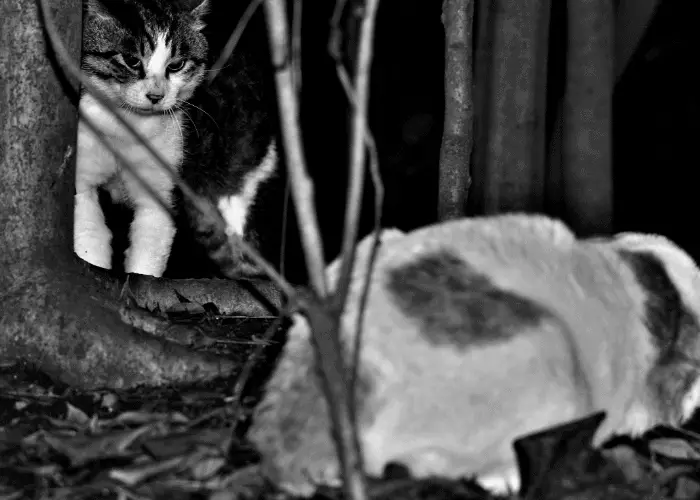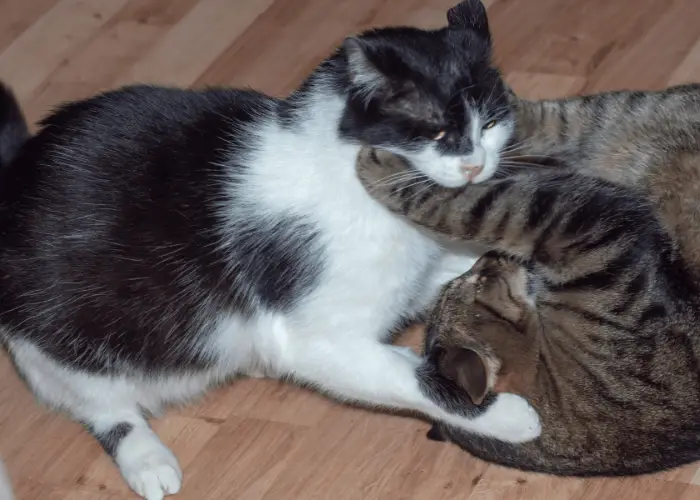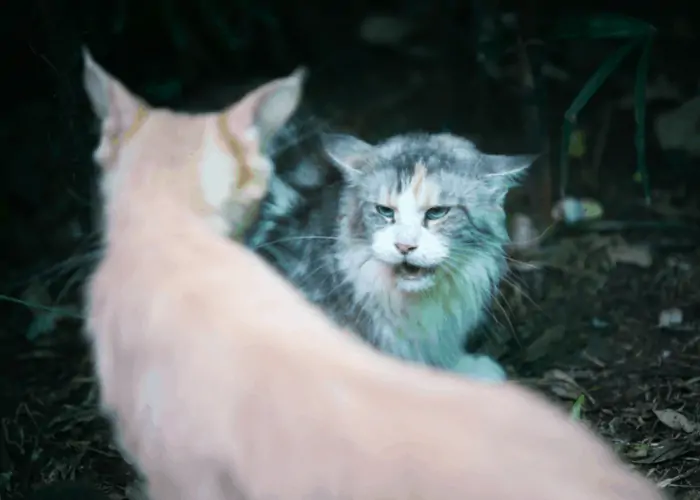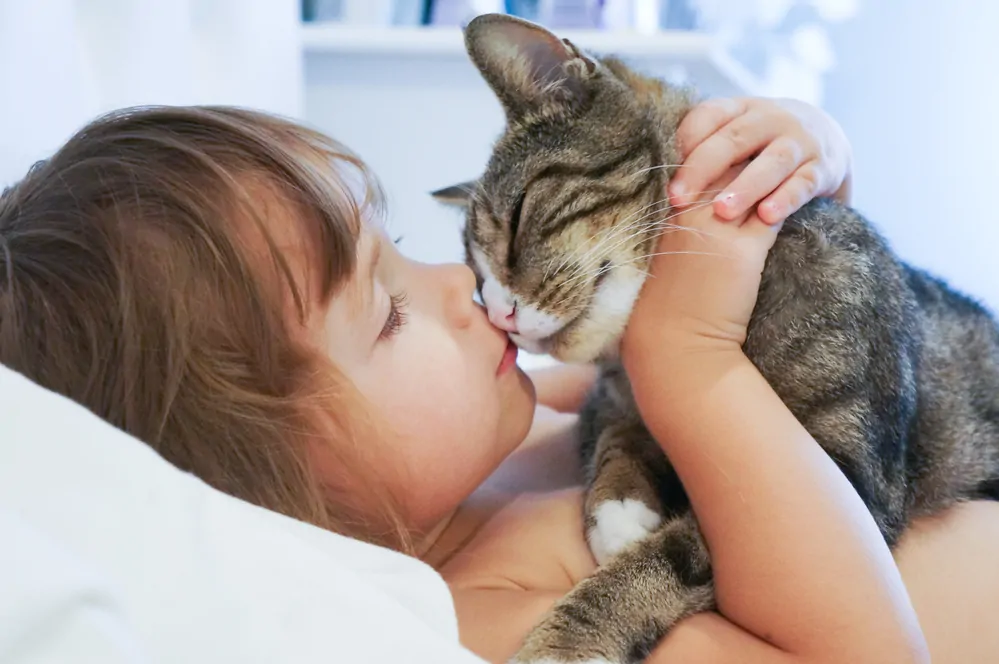If you have a handful of cats or live in an area where a group of cats nightly prowl the streets, you may notice they tend to get into fights from time to time. We can typically hear them winding into the fight long before we can see them get into it.
Why do cats fight at night?
Cats fight at night most of the time because they are nocturnal, which means they are more active during nighttime than during the day. Battles take place over territory, mates, or food sources, and we’re more likely to notice it at night.
Being equipped for night stalking, cats who don’t regularly hook up are more likely to run into each other
Often, we hear sounds that alert us to a catfight but aren’t a fight at all. The majority of the noise that chills unsuspecting sleepers to the bone are a host of warnings mixed in with some posturing, and if these tactics fail, the claws come out.
Do Cats Only Fight at Night?

Some people might think that cats only really go at it at night, but the truth is, cats can fight at any time of day. People who own multiple cats can attest to this wholeheartedly.
But at night, as stated above, the world tends to take it down a few notches. People trying to sleep can easily notice a couple of cats making all kinds of racket outside much easier than if they were partaking in their daily activities that may consist of noise and attention.
Also, nighttime is when a cat gets to partake in its stealthy nature, hiding in the shadows while creeping up on unsuspecting critters. Nightly ventures may take them outside of their daytime comfort zone, and into someone else’s turf- which can end in a fight.
Intentions Set the Conditions of a Cat Fight
Cats don’t fight on sight for no reason at all. Every catfight starts for a reason, but not every reason is clear to an observer. Even cats that are otherwise best of friends can suddenly combine into a ferocious ball of spinning claws and fur.
Reasons Why Indoor Cats Fight

Indoor cats are more prone to fight day or night, rather than mostly at night. They are always just as likely to become annoyed by their feline roommates no matter what time it is.
Cats that have grown up together, play with each other, curl up beside one another, and even eat together, can start fighting without warning. Most of the time it happens as they come of age and are not fixed.
Dominance
Who rules the roost begins to become a factor as they come of age. Fighting for dominance isn’t reserved for animals in the wild, but can take place in the home with our cats.
Mothers
A litter of small kittens can also give reasons for an overprotective mother to aggressively ward off curious, even well-intentioned cats (particularly males). As the kittens grow and become more mobile, the radius that the mother will defend will grow accordingly.
Sketchy Behavior
All cats have different personalities and at times, certain behaviors can just rub other cats the wrong way. If a cat behaves sketchy, meaning jittery, nervous, skittish, or jumpy, it can become its own worst enemy among other cats.
Those behaviors trigger the predator instincts that reside in all cats and can be the cause for them to get attacked by unassuming, otherwise friendly cats. Size is irrelevant in this regard. A big strong yet nervous or sketchy cat will get bullied by smaller, weaker, yet more confident cats every time.
Reasons why Outdoor Cats Fight

Outdoor cats have a different set of reasoning when it comes to fighting. Most of the time, it’s when cats who are unfamiliar with each other cross paths, rather than cats who are used to seeing each other around the neighborhood.
Ignorance of intentions will open up a can of reasoning to either try to ward off the intruder or duke it out.
Defending Turf
Unsuspecting turf invasions are usually a quick spat, resulting in the trespassing cat heading for the hills (depending on the cat).
Bearing no intentions to become a problem, the invading cat won’t typically push the issue and will leave after an initial violent burst. In this circumstance, the fight itself is quick but the build-up can take several minutes.
However, if the intention is to start trouble or gain turf, the fight can last for a bit longer, and is far more dangerous to both cats, as they’re both fighting for their lives. Unlike the accidental intruder, the intentional intruder is there on a mission, and the defender doesn’t want to lose ground- neither will relent easily and can result in mild to serious injuries, or even death.
Food
Outdoor cats might also fight over food if they’ve caught something they don’t want to share with other hungry cats. This behavior is also shared with their larger, non-packing cousins in the wild.
Mating
Mating can launch fights from every direction. When a female cat is in heat, male cats tend to show up out of the woodwork. If they arrive at the same time, they may wind up fighting.
Also, there’s a window of a few days that females don’t behave as if they’re in heat, but launch off pheromones before being in full heat. Males will push the issue before she’s in the mood (in full heat) and can be the start of a fight.
Sometimes, certain cats just flat out, don’t like each other and decide to let the fur fly. Either way, the majority of these reasons to fight concerning outdoor cats will be more likely to take place at night than indoor cats.
Final Thoughts

Two or more cats threatening and warning each other is a chilling sound that can fill the ears in the dead of night. They make sounds that don’t seem natural at all and at times might even sound like a small human taking in a foreign language that nobody else speaks.
Even though cats can sound like that, it doesn’t mean that a fight is inevitable when they get into this mode. There are times that it sounds like there’s an all-out war, but that’s the thing about their noises.
When a cat, dog, or any wild predator is attacking, they become eerily quiet. They focus on their prey and attack as quickly and as silently as possible in a burst of violence. With cats, noises being made are done so in hopes to avoid a fight, and is a contest to see who either backs off or attacks first.
Hissing, yowling, loud chattering, growling, and that disturbing human-like sound they use are all an attempt to warn and ward off a perceived threat.
The high-pitched screams that happen during a fight are just that and can be heartbreaking to hear when there’s nothing you can do about it. But, the good news is that a lot of the time, it sounds much worse than it is.
Cats are incredibly tough animals and can often take it just as well as they can dish it out (fortunately for them).


